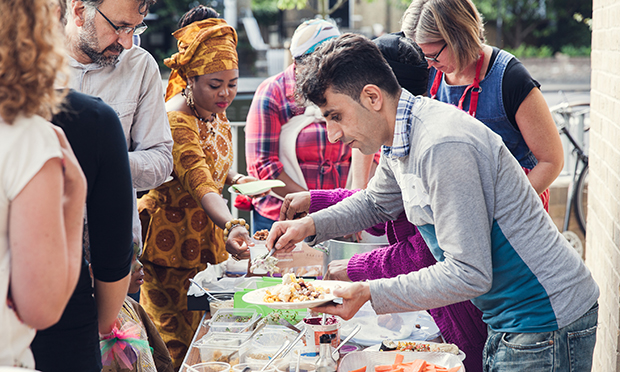Akwaaba – a place of welcome for Hackney’s migrants

Breaking bread: Akwaaba members serve food at their summer party. Photograph: Andy Donohoe
Our society’s complicated attitudes to migration have become increasingly polarised in recent years.
On the one hand, the empty walls and garage doors of Dalston are sprayed with “Refugees Welcome Here” stencils, symbolising a movement that galvanised an estimated 10,000 people to march through central London on 17 September, demanding that our country do more for refugees.
On the other hand, both local and central government opposes calls for the UK to host more refugees, while politicians use migrants as scapegoats to avoid addressing legitimate social and economic issues faced by the electorate.
The Immigration Acts of 2014 and 2016 were explicit attempts to legislate into existence a “hostile environment” towards unwanted migrants.
At a local level, councils are failing to meet the targets of the Syrian Vulnerable Persons Resettlement Programme.
Hackney has managed to accommodate just two families in the year since the scheme was announced.
More shockingly, our borough routinely allows children of migrant parents who are not allowed to work to live in destitution, without enough money to pay for food, clothes or utility bills.*
Meanwhile, incidents of racist crime and abuse have spiked after major events such as the attacks in Paris of November last year and the EU referendum in June.
It was with this landscape in mind that a group of Hackney residents led by members of Green Lanes Methodist Church and the Hackney Migrant Centre came together in November 2014 with the aim of creating a social space for refugees, asylum seekers and other migrants.
We named the project “Akwaaba”, meaning “welcome” in the Twi language of Ghana.
Akwaaba started with a blank canvas. We wanted it to be a place of welcome and social solidarity, bringing together migrants and non-migrants in Hackney every Sunday afternoon.
As the community grew, the outlines of Akwaaba came into view, starting with three essentials: a hot meal, coffee and wifi.
Soon we filled in the details – board games, children’s activities, arts and crafts, music and much more.
Fast forward eighteen months, and the picture now includes a bike project, language classes, drama workshops, hair and beauty treatments, a singing group, a befriending scheme, and more besides.
Everything is run on a shoestring by volunteers, many of whom are themselves migrants who first came to Akwaaba as visitors.
Like the rest of our borough, Akwaaba is a diverse community.
Members include recognised refugees as well as those who are still waiting for their applications to be heard. The process can take years, during which time people are left in limbo, unable to work or plan their life.
They also include British or EU citizens who have fallen on hard times or slipped through the cracks of our welfare system and families who, barred from employment and benefits by their immigration status, are forced to depend on community projects like Akwaaba.
Some people have been living in this country for decades, others for a matter of weeks.
The UK’s decision to isolate itself from recent movements of refugees into Europe has left many people feeling powerless in the face of humanitarian crisis.
Part of Akwaaba’s success is that it provides a small but concrete way for Hackney residents to make a difference on a local level.
In less than two years, our community has grown to include more than two hundred people and is supported by a network of local businesses and voluntary organisations.
Akwaaba not only demonstrates the great enthusiasm of the people of Hackney for supporting the most vulnerable members of our community and welcoming new arrivals but also their resourcefulness when given the opportunity to help.
I hope our new mayor is watching!
*In response to this point, a Hackney Council spokesperson said: “The council will do everything in its power to support those in need that are either referred to us by another organisation or authority, or have approached us directly. We are currently supporting 80 families who have been assessed as being in need.”
Michael Boyle is one of the founders of Akwaaba, which in July this year won the Adiaha Antigua Award for its work with refugees and asylum seekers.
For more information visit
www.akwaaba.org.uk
To donate to Akwaaba, go to
www.youcaring.com/akwaaba
